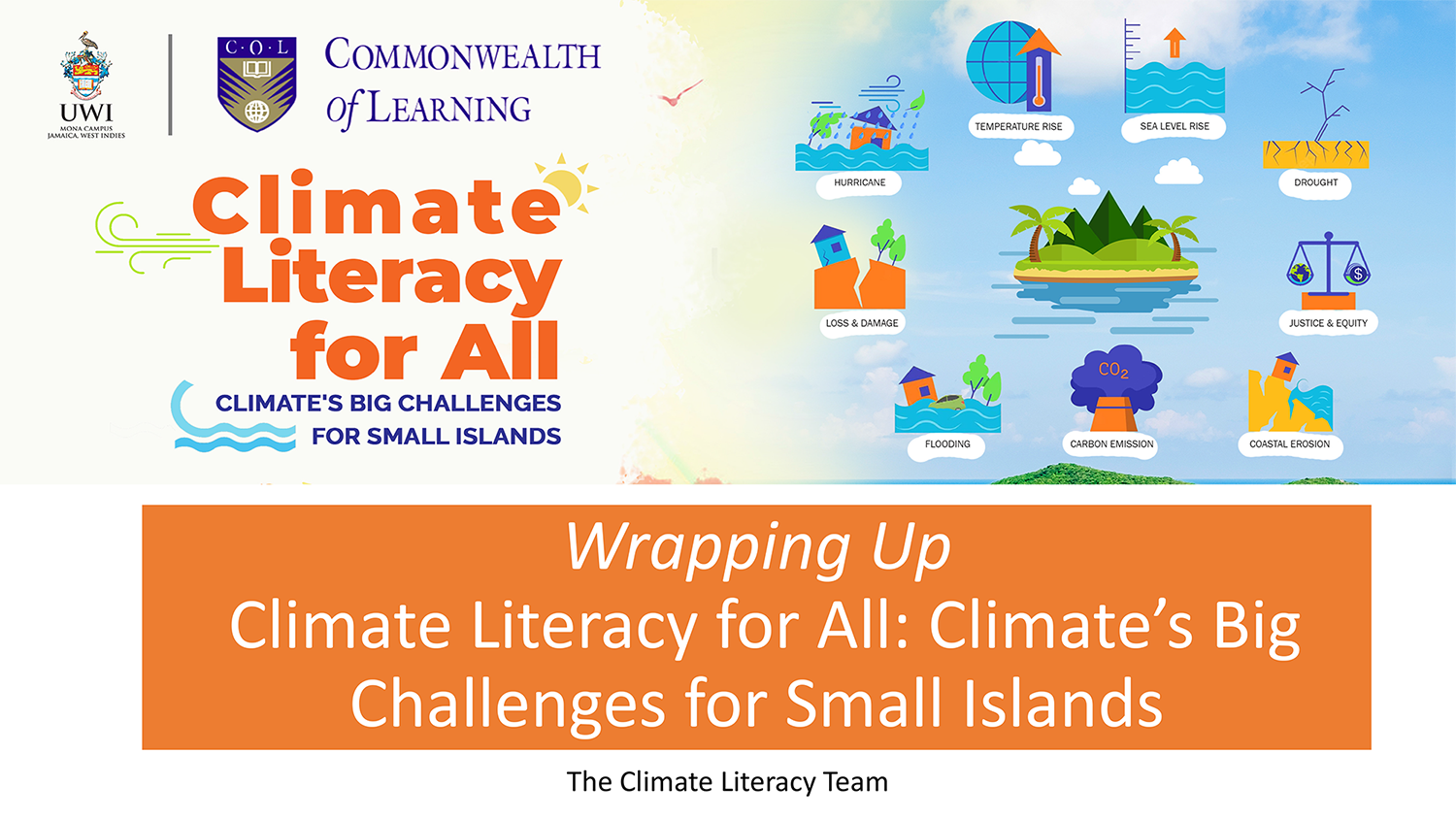
Making an impact on public perceptions around climate change
Like so many of the planet’s modern-day problems, the public discussion around climate change can quickly become a complex, confusing debate, often polarizing and rarely straightforward. From technical issues to misinformation, wading in to the issues around climate change can require a foundational knowledge that can be difficult to find in the hyperbole that often surrounds coverage of the issues in mainstream media.
This is why The University of the West Indies’ recent MOOC (Massive Open Online Course) on climate literacy offered in collaboration with The Commonwealth of Learning appears to have struck such a positive chord with almost 800 learners who participated in the first offering of Climate Literacy for All just before Christmas 2023.
What were some of the aspects of the course that made it such a compelling course?
For starters, the course focused on climate change through the lens of small island developing states (SIDS), who are extremely vulnerable to climate change impacts despite being responsible for less than one percent of global greenhouse gas (GHG) emissions.
This unique viewpoint attracted a large group of learners, many who were more than willing to participate in the online discussions around each lesson.
““It was very good to see people so willing to assist one another on a MOOC,” says UWI’s Dr. Charmaine McKenzie who who provided instructional design support on the MOOC. “There were a number of people who shared quite a bit of their ideas and experiences, they were very into the course.”
That level of engagement was by design, with the instruction team being what Charmaine describes as “more hands-on than hands off.” Being the first time the course was offered, the team wanted a highly interactive experience, which came through loud and clear.
COL Education Specialist Dr. Mairette Newman, was thrilled to see the degree of learner interaction in action and clearly understands the significance of climate literacy to people from SIDS.
“The MOOC helped dispel some of the more common misconceptions about climate change, and provided learners with the fundamentals of climate change science, adaptation and mitigation,” she says. “But perhaps the most important aspect of the course was the framework around climate justice that was provided by climate change scientists working in small states across Africa, the Caribbean and the Pacific.”
The course drew on a real-world examples from SIDS to demonstrate the importance of both mitigation and adaptation solutions as a long-term strategy for meeting key sustainable development goals, making the course an activity that supports COL’s Green Learning Agenda.
Learning more about success factors
With the vast geographic spread of learners – including from countries as widespread as Dominica, Trinidad and Tobago, Jamaica, Malaysia, Swaziland, South Africa and Seychelles – time zones were a challenge, but not something that couldn’t be overcome.
Charmaine acknowledged there were also some learnings for the instruction team, and a few things that they’d approach differently next time.
Overall though, the feedback from participants was enthusiastically positive, with learners commenting:
“The course reminded me that climate change is ‘everybody’s business’ and I too need to play a part in formulating localised solutions and adaptation strategies. I have since been more conscientious of my actions.
Further to this, with the help of another teacher, I have founded and am overseeing an Environmental Science Club within the school where I work in an attempt to get students onboard to reduce these effects.”
Sherika Elliott, Jamaica
———————————————
An interesting idea from the course was when we learners had to calculate our carbon footprint. Before the course, I knew the impact of one’s carbon footprint on climate change but I never considered my individual contribution.
Learning my carbon footprint was scary, unexpected and enlightening. I was afraid to see my score, my results were unexpected (I thought my score would have been lower), but I was happy to know that there were things I could do to lessen my impact. Learning my carbon footprint really got me to make changes in my daily activities,
Shanna Bassano, Trinidad and Tobago
———————————————
The course enlightened me about the vulnerability of SIDS to climate change and the commendable efforts of these nations that have been responding to this issue, even though their carbon emissions rates are negligible.
Mark Ram, Guyana
———————————————
The course helped me to realize how many other small islands around the world are being severely impacted, some being even at much greater risk than we are in the Caribbean islands. So this helped to paint a clearer picture for me on how many parts of the world are being impacted by the effects of climate change, and helped me to understand how urgently we need to act to address these issues.
Ashley Massicotte, Dominica
———————————————


Sorry, the comment form is closed at this time.